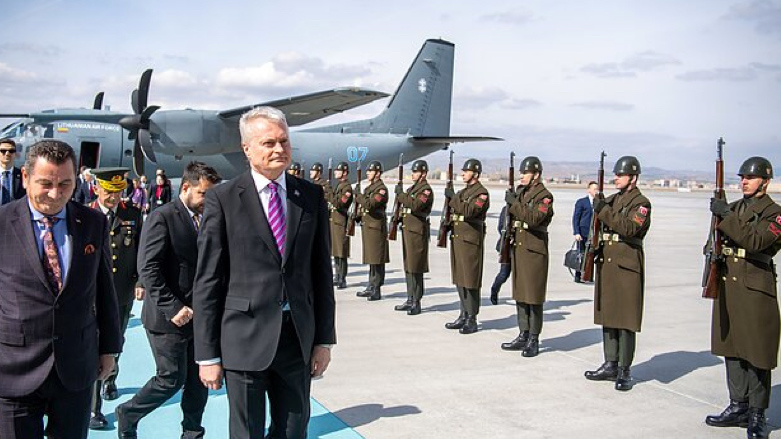Erdogan: Turkish Assembly won’t consider Sweden’s NATO bid until October

WASHINGTON DC, United States (Kurdistan 24) – In what appeared to be another twist in the long-running effort by the U.S. and major European allies to secure Ankara’s approval of Sweden’s bid to join NATO, Turkish President Recep Tayyip Erdogan, who had finally agreed to Sweden’s accession on Monday, announced on Wednesday that Turkey’s parliament would not consider the issue until October, when it will have returned from summer recess.
Western leaders who had thanked Erdogan on Monday and expressed their appreciation for his decision, including U.S. President Joe Biden, had been operating on the assumption that the vote on Swedish accession would occur this month.
But that will not be. Apparently, the stumbling block is Congressional approval of Turkey’s bid to purchase more F-16 fighter jets and acquire modernization kits for those already in its possession. The issue, in turn, is tied to the rivalry between two NATO allies—Greece and Turkey—as well as U.S. domestic politics.
That, at least, is the suggestion of Amberin Zaman, who reports on Turkey for Al-Monitor. On Wednesday, following the conclusion of NATO’S two-day summit in Lithuania, Erdogan held a news conference in which he said, “The parliament is not in session for the upcoming two months…but our target is to finalize this matter as swiftly as possible”--that is, in October.
“Turkey’s push to overcome congressional sanctions and acquire F-16 fighter jets from the United States remains the main sticking point, sources familiar with months of back-channel diplomacy aimed at getting Turkey to approve Sweden’s membership told Al-Monitor,” Zaman explained.
The U.S. Senate must approve any such weapons sale, and a powerful senator, Bob Menendez, a Democrat from New Jersey, has long held a skeptical view of Erdogan. He heads the Senate Foreign Relations Committee, and, as Zaman explained, he is “the chief opponent of easing military sanctions on Turkey.”
Immediate Background to Latest Shift
On Monday, NATO Secretary General Jens Stoltenberg hosted a meeting between Erdogan and Swedish Prime Minister Ulf Kristersson. After that meeting, Stoltenberg announced that Erdogan had dropped his opposition to Sweden’s membership in NATO.
Read More: President Erdogan approves forwarding of Sweden's NATO accession protocol to the Turkish parliament
The NATO summit followed on Tuesday and Wednesday, with other heads of state believing that Sweden would soon join NATO. In that context, Biden met with Erdogan and expressed his appreciation for Erdogan’s “diplomacy” and “courage” in agreeing to Sweden’s NATO membership.
But that was illusory. State Department Spokesperson Matthew Miller was asked on Wednesday about Erdogan’s statement that the issue would not go to the Turkish parliament until after their summer recess.
Miller responded with some delicacy, a reflection of the strong bargaining position that Erdogan now enjoys as a result of the war in Ukraine.
“We welcome the president’s [Erdogan’s] support,” Miller said. “We think that’s serious, and we would urge it to happen as soon as possible.”
Congressional Obstacle?
On Monday, after Stoltenberg announced that Erdogan had agreed to Sweden’s NATO membership, Sen. Menendez said that he was discussing with the Biden administration the sale of 40 F-16 fighter jets and 79 F-16 modernization kits to Turkey.
Then, as Zaman recounts, Menendez said that “there needed to be a way to ‘beef up Greece’s security’ and obtain ‘assurances’ about ‘future actions.’ Asked how long it might take him to make a decision, he said, ‘Probably, if there can be one, in the next week.’”
Erdogan is a very practiced negotiator. Before he gives up his bargaining chip and sends the issue of Sweden’s NATO membership to the Turkish parliament, he wants to be sure that Menendez will not block the fighter jets and modernization kits.
Moreover, “a significant number of Menendez’s constituents are ethnic Greeks and Armenians,” as Zaman noted, and U.S. diplomatic efforts have focused on reducing tensions between Greece and Turkey, with the ultimate aim of reaching a “comprehensive settlement” between them.
Toward that end, Erdogan met with Greek Prime Minister Kyriakos Mitsotakis on the sidelines of the NATO summit in Lithuania.
The meeting appeared to go well. Afterwards, Erdogan said they had discussed how to “enhance their friendship,” while Mitsotakis stated, “Today’s meeting confirmed my intention and that of President Erdogan to reset Greek-Turkish relations.”
At this point, it seems likely that the situation will proceed smoothly. Turkey will get the assurances it wants on the sale of the F-16s and modernization kits, and the parliament will approve Sweden’s NATO bid.
But, of course, the opposite is also possible.There is significant room for one or more unexpected developments that could derail the entire process and block Sweden’s accession to NATO.
